- Home
- Paul Fleischman
Rear-View Mirrors Page 2
Rear-View Mirrors Read online
Page 2
I waved away his vile-smelling smoke. “Is listening to this the ‘remarkable opportunity’ you dragged me here for?”
“The decision to come was yours,” he replied. He blew a smoke ring into being and watched it jellyfish through the air. “As for the opportunity I mentioned, I can put it quite simply: I’m seeking an heir.”
I cocked my head in surprise. “An heir?”
“I’ve led a solitary life,” he announced. His manner was disinterested, businesslike. “George Washington, in his farewell address, warned the nation against ‘entangling alliances.’ I applied his advice to my personal life, and always found it to be sound counsel. Now, however, with my end drawing near, I’ve discovered myself desiring a successor. Someone to defend my reputation against critics and my grave against snowmobiles. To whom I could entrust the house and land, and the continuation of the Virgil Stark series.” He walked to a window and gazed outside. “I felt I was bound to contact you first, as my only relation, aside from my brother. Though family blood counts for nothing in this. Should you prove unfit, or not want the position, I’ve a large pool of other applicants to draw from.”
I studied my father in disbelief. “But your end’s not drawing near—you’re still young.”
“Forty-nine, to be exact. And a recent sufferer of heart palpitations. Cardiac disease, it so happens, struck down both my father’s parents.”
“But even so—” I responded lamely. On the top shelf of the bookcase beside me I spotted a pair of cycling trophies, looked closer, and made out his name on both, struck that a former athlete should have so little confidence in his body.
“I suggest you give me, and New Hampshire, a month. After that, I’ll pay your way back when you like.” He turned around. “Have you eaten?”
“On the bus.”
“Then you’ll probably want to get some rest. Your room’s upstairs, at the end of the hall.”
He stood where he was, making no motion to help with my suitcase or show me the way.
“You may find it somewhat warm upstairs for sleeping, by California standards.”
He smiled smugly. I thought of the heat in Sacramento, my mother’s hometown, and was about to speak up when he continued.
“Your mother whined constantly about the humidity. In light of which fact, and in spite of your sex’s reputed edge in physical endurance, I’ve placed a small electric fan by your bed.”
Some choice: I could either swelter or admit that my mother and I and all females were frail.
“Should you find it necessary,” he added.
Lifting my suitcase, I tossed him a flat “Good night,” marched up to my room, put the fan in the hall, and shut the door. It would just be four weeks, I reminded myself. Then he could sort through the rest of his “pool” of applicants—if they existed. Which, I mused while opening the windows, seemed highly doubtful. Which, in turn, explained the welcome I’d received, or the lack of it. For despite his unruffled, rhetorical style, my father was clearly desperate: sick with the fear of death, a disease for which I was his only known cure. His casual rudeness was merely a face-saving show of resistance to our new roles. He’d cast me aside; now he must court me.
Fanning myself with a magazine, I turned a circle in the center of the room. It was small and low-ceilinged, containing a bed, night table, rocking chair, bookcase, and chest. On one wall was a frame holding two amber moths. I approached and read the label beneath them: “Huckleberry Sphinx.” I went to the bathroom, nearly falling over the fan when I walked out the door. Then I got my nightgown out of my suitcase, slipped it on in the dark, and lay down. Two minutes later I took it off. Two minutes after that I noticed I was starting to think about the fan, then clenched my teeth and struggled to forget it. I was slippery with sweat. Mosquitoes whined in my ears. No hint of a breeze entered the windows, just the racket of crickets and frogs and God-knew-what-other natural insomniacs. I felt as if I was on the set of Tarzan, not snug in some quaint New England village, and wondered if I’d be dead of malaria by the time my month here finally ended. I tried to put myself to sleep by fantasizing my return to California: kissing the concrete at the Oakland airport, inhaling the salt air, rejoicing in the fog, pledging my allegiance to the Golden Gate—then was interrupted by the call of a bird. It was simple and clear and very close by: three notes repeated over and over. It was new to me, and seemed strangely sad. Abruptly, the singing stopped, though the song continued to sound in my head. And suddenly I remembered my mother’s recollection, on the way to the airport, of listening to this very bird’s call her first night in the East—and sat up in bed, wide awake, realizing I too had just heard my first whippoorwill.
3 / Butterflies
The sun rises, stares me straight in the eye, and I grope for my watch on the table. It reads 5:15, but my body is still in California and feels strongly that the sky should be black, the birds silent, and sensible people asleep in their beds. I get up from mine, put on T-shirt and shorts, and search my backpack for the New Hampshire map. I take out the bag of granola as well, and admire the pack a moment: it’s new, bought with the money I earned this year, a step up from my mother’s hand-me-down suitcase. Then I go downstairs, case the kitchen, and give thanks to my uncle when I find some canned milk. I decide that if I choose to live here when the house becomes mine on my twenty-first birthday, I’ll always keep a six-pack of his beloved Bluebird ale on hand.
I take my bowl of granola outside and sit in the sun on the porch steps. The air is cool. Spiderwebs are still dewed. Swallows are swooping around the barn. I unfold the map, locate North Hooton, then spot Lake Kiskadee to the north. I wonder how the ride came to be an annual tradition for my father and am startled to measure it for the first time and find that it’s nearly a seventy-mile loop. Longer, I reflect, than the trip across my high school stage at graduation last week—but otherwise so similar. I recall my mother standing when my name was announced and clapping conspicuously, despite which spectacle I managed, somehow, not to trip on my robe. I’d always been a good student, had earned straight As that semester, and graduated with honors. She was proud of me; by her standards I’d succeeded and was now, in her eyes, an adult. But for me the ceremony felt incomplete. Which is why I stopped here on the way to Maine: to perform a corresponding rite of passage in the imagined presence of my father. To attempt the ride he took each year. To acknowledge his influence and picture his approval. To graduate in his eyes.
I take in my bowl, find a grocery bag, and put in it my wallet and knife and some food. I fill my canteen and put it in too. Then I comb my hair—I’ve let it grow out since last summer, till it now almost reaches my waist—braid it to keep it out of my face, put on a cap, and lock the house behind me. A swallow flies out the barn door when I open it. I wheel out the bike and clean off the seat. It’s an old Raleigh ten-speed, forest green under the dust, with a small wicker basket in the front. Not likely to be seen in the Olympics, but it’ll do for me, as it did for my father. I close the barn door, put my bag of supplies in the basket, and straddle the bike. I pause. Then I raise the creaking kickstand with my foot. And suddenly I’m off.
I slither down the dirt drive, turn onto the harder-packed dirt of Hatfield Road, and find out at once that the seat is too high. My feet can barely stay with the pedals—not surprising, given my father’s height. I figure that I can put up with it till the gas station, then start up a rise. I reach for the changer and shift down two gears, relieved to learn that the derailleur works. I pass the Rabbs’ house. The road turns to pavement and the air is suddenly sweet with hay. I hear chickadees calling and see what I think might be a chestnut-sided warbler. Then I coast down a hill, the cool air raising goosebumps, spot the white spire of the Congregational church, turn right, and pull in at the gas station.
The “Closed” sign is up. It doesn’t open till seven. I look at my watch, find it’s only 6:20—then hear what sounds like a tool falling. I walk around to the side of the station and am surprised t
o see the garage door open, a car inside, and a pair of black sneakers sticking out from under it.
“Excuse me, but can I fill up my tires?”
A body slides out from beneath the car and I’m further amazed to find that it’s Owen’s.
“Olivia! How do you like that.”
This, I note to myself, is one of his longer speeches on record. I smile. “Didn’t think I’d run into you here,” I state truthfully. “But I’m glad I did.” Also true.
“Just fixing my car. Before I start on other people’s.” He stands up, as tall as I am now, and seems pleased to see me. A great relief, since I’m much in his debt, unknown to him.
“I’ve got the carving on my dresser at home,” I say, repaying part of it.
Modestly, he shrugs this off, wiping his greasy hands with a rag. “Sorry about your dad last fall.”
“Ancient history,” I answer him, shrugging off his statement in return. We catch up on the past twelve months and trade fall plans: U.C.L.A. for me, building cabinets in his uncle’s shop for him. He fills my tires till they’re hard as granite, checks my chain, and gives it some oil. Then, even though I can do it myself, I let him lower the seat a few inches, perhaps to provide further cause to thank him. Which I do several times, explain I have to go, and promise I’ll write him about the dig.
I ride half a block to Danforth’s Grocery, take a newspaper from the pile by the door, and leave a pair of dimes in payment. I open it up to the weather, find there’s a chance of showers, then spot what I’m after: “Sunset: 8:30 P.M.”
I stuff the newspaper into my basket and glance at my watch. It’s 6:45. Which leaves me something more than thirteen hours. For the point of the ride, my father made clear, wasn’t simply to view the scenery along Highways 30, 14, and 520—but to make it back home before the sun went down. An odd condition, like the wearing of gowns and mortarboards at graduation. But one I’ve sworn myself to meet.
I return to the crossroads, head north, and soon am informed that I’m leaving the village of North Hooton. After which I start up my first real hill, wondering—since I’m no marathon biker—why I didn’t look at a map, see that the ride would be seventy miles long, and train for it back in California. Panting, I reply reasonably enough that I assumed I could easily pedal as far as a fifty-year-old with heart palpitations. And all of a sudden, as I crest the hill, my father’s motive in taking this trip is revealed to me: it’s no sightseeing tour, but a race, against the coming of night. A race he must have relished last summer, performed during one of those occasional spells when his surrender to hypochondria was replaced by a passion for besting Death. The same mood of defiance, no doubt, that led him up to his roof in a thunderstorm.
I shift gears, pass a cornfield on my left, and gradually regain my breath. Then I’m jolted by the thought that, just like my father, I’m using this trip to resist his mortality. Resurrecting him by reenacting his ride, taking his Raleigh over his old route as if to maintain the illusion of his living. The notion stuns me. I wonder if it’s true. Then two butterflies flit in front of me, and as if I’m on Eastern Variable Time, my mind at once jumps back a year.
***
“Butterflies are lured to nectar, men to butterflies.”
I turned from the mounted pair I’d been eying and beheld my father coming downstairs. It was late in the morning, my first in North Hooton. Out of foolish politeness I’d held back from eating breakfast alone and was famished.
“I see that you too are a lover of the order Lepidoptera,” he proclaimed.
“Actually, what I’d love even more at the moment is some food.”
“And who could resist,” he continued, approaching the butterflies, “the alluring sight of one of nature’s most flighty and ephemeral creatures preserved behind glass, fixed in space and immune to the passage of time.”
Was this, I asked myself, the explanation for his ardor for them: not as insects to be appreciated in the field, but as symbols of eternal life, poised permanently in midflight on his walls?
“Shall we grab a net and collecting jar and see what we can find fluttering about?”
I rolled my eyes at his wishful presumption that I shared his obsession. “Maybe later. I’m starved.”
“Starved! Is that all you can say this morning?”
He stepped back and glared at me with contempt. “I perceive distinct signs of Dr. Spock’s second edition in your upbringing. Feeding on demand!” He sneered at the notion and entered the kitchen. “Or did your mother prefer Machiavelli’s The Prince for guidance in raising a grasping child?”
I charged after him. “And where were you with your expert advice on childrearing?”
He closed a cupboard and turned to face me. “You don’t know how lucky you are I wasn’t there. I wasn’t meant for marriage, and certainly not for raising children. No more than were my parents.” He gestured toward a framed photograph on the wall. “As they demonstrated in the naming of their offspring.”
I glanced from their faces to his. “Why ‘Hannibal’?”
“They were both professors of history. Collaborating, at the time of my birth, on a book on the Roman Empire. A project they felt, no doubt rightly, that I threatened.”
I looked back at his parents, both smiling warmly, and wondered how they could have done such a thing.
“My brother Leo’s full name is Napoleon. Born just as they were starting their study of Russia.” He took out a bag of bagels from the refrigerator, then gave me a basket. “Speaking of which, go out to the barn and see if socialism is still intact and each hen giving according to her ability.”
I walked outside and over to the barn, realizing I’d never been in one before. Cautiously, I opened the door and was greeted with soft, suspicious cackling. I stepped into the gloom. Suddenly I made out a goat to my left, instantly froze, then discovered with relief that it was penned. To my right was a waist-high row of nesting boxes. The half dozen hens occupying them muttered conspiratorially as I poked around in search of eggs. I didn’t find any and was about to leave—then it dawned on me that they were under the hens. Not chancing to be dressed in armor, I ruled out reaching my bare hand underneath. Then I noticed a rake, picked it up, positioned myself at a respectful distance, and gently budged a hen off her nest. She burst into flight. I crept forward, brandishing the rake in defense, and found two brown eggs. Placing them proudly in my basket, I retreated, held out the rake, and proceeded to bulldoze the lot of them off their nests. With hens flying and squawking and scuttling, I hurried down the row, snatched up six more eggs, headed gratefully for the door—and slid three feet on a pile of droppings, launching my harvest into orbit before I fell.
Eggs splatted all over the floor of the barn. I slowly picked myself up from the straw and manure, feeling fouled for life, and looked in the basket. Two eggs remained. I cursed the chickens, all cackling merrily, cleaned myself off with a rag, then wondered if my father might be coming to investigate. Fearfully, I grabbed a shovel, scooped up the wreckage of shells and yolks, and dumped the slimy mess in the goat’s pen, praying that goats ate eggs. This one did.
I picked up the basket and straightened my hair, tried to seem calm, strode out the barn door as if I’d just graduated from charm school—and nearly had a head-on with my father, who was carrying an old soup kettle.
“How many this morning?”
I showed him the basket.
“Two eggs?”
I nodded.
“I need six to make omelets. And as your mother and all good revolutionaries know, you can’t make an omelet without cracking eggs.” He turned toward the hens. “Or without laying them.”
He entered the goat’s pen, tied her neck to a post with a rope, and began milking her.
“Ever taste goat’s milk?”
“A few times,” I lied. I watched him shoot it into the kettle, studied the goat’s strange coffee-colored eyes, then gaped at the sight of bits of shell on her chin.
“Is that
all you’ve got?” my father asked her, peering into the kettle.
I considered brushing off her chin myself, but didn’t feel like finding out firsthand whether or not goats bite.
“You can forget about that two-week vacation on the shores of the Black Sea,” he informed her. He gave a few final squeezes, untied the goat, and, to my relief, left the pen. “And Lenin aside,” he boomed to the barn at large, “there won’t be any ‘withering away of the state’ whatsoever around here. Not until milk and egg yields go up!” A comment, like so many others, mocking my mother—and indirectly me.
We returned to the house and finally had breakfast, during which I took my first sip of goat’s milk. And last—I spit it all over my plate. It may have been country fresh, but it tasted to me like it had sat in the sun for three months.
“Now for our stroll through the field,” said my father.
I felt like I’d already had more than enough of Mother Nature that morning. But what else was there to do in this wasteland? He fetched a butterfly net, handed me a jar, and we set off out the back door.
“Those are red pines you see at the edge of the field,” he proudly declared. Not that I’d asked. “I tended that grove on weekends as a boy.”
I could think of better things to do with a weekend.
“That tree you see over there is a beech.” He pointed as we wandered through the long grass. “Smooth gray bark. Leaves yellow in the fall. Muscular trunks—always make me think of the human limbs Michelangelo drew.”
He paused to admire the tree a moment and I suddenly saw what he wanted in an heir. Someone to whom he could leave not simply his house and land but, more important, his loves: for his pines, for beech trunks, for butterflies. A successor who, far in the future, would take his own grandchildren on this same walk, view the same tree, and speak of Michelangelo. Someone through whom his enthusiasms would survive.
“The white flower to your left is Queen Anne’s lace.”

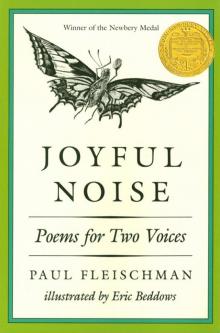 Joyful Noise
Joyful Noise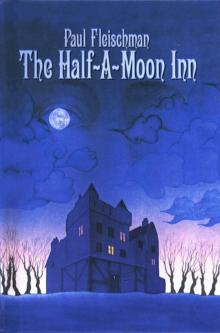 The Half-a-Moon Inn
The Half-a-Moon Inn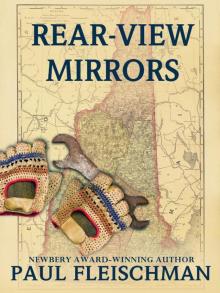 Rear-View Mirrors
Rear-View Mirrors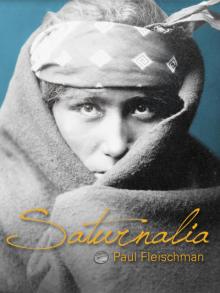 Saturnalia
Saturnalia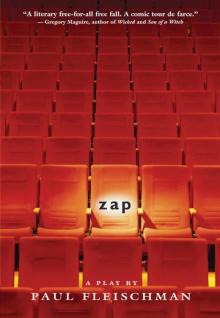 Zap
Zap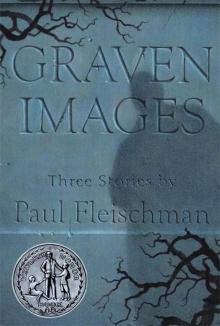 Graven Images
Graven Images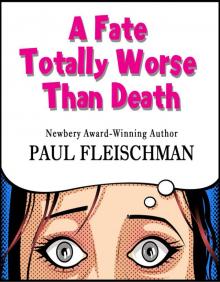 A Fate Totally Worse Than Death
A Fate Totally Worse Than Death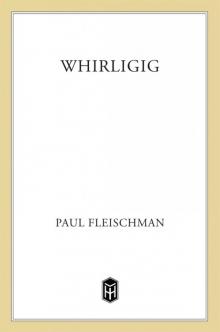 Whirligig
Whirligig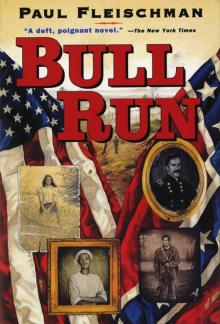 Bull Run
Bull Run